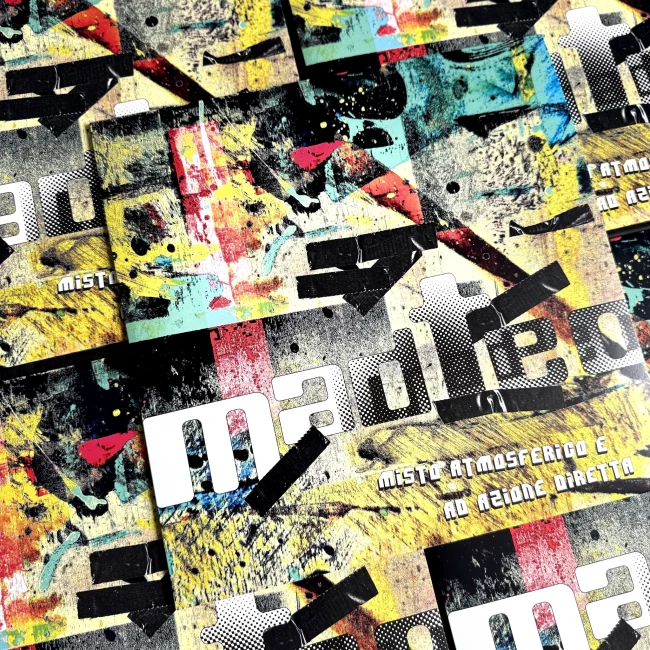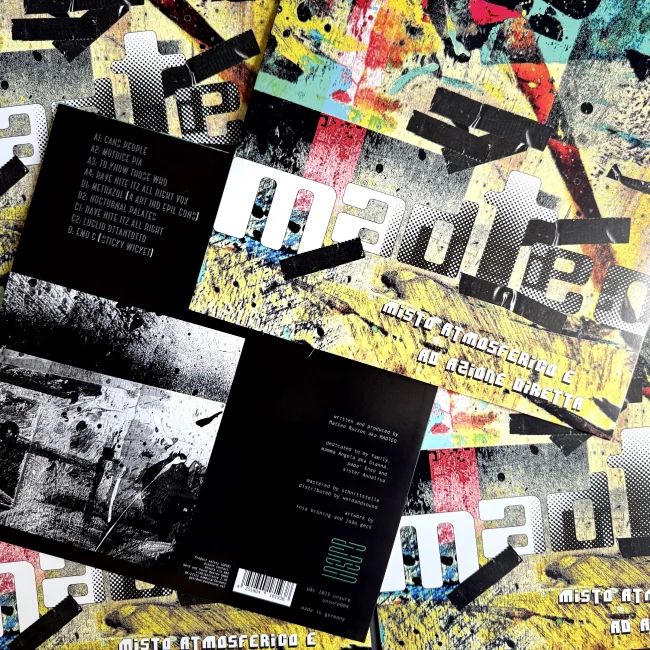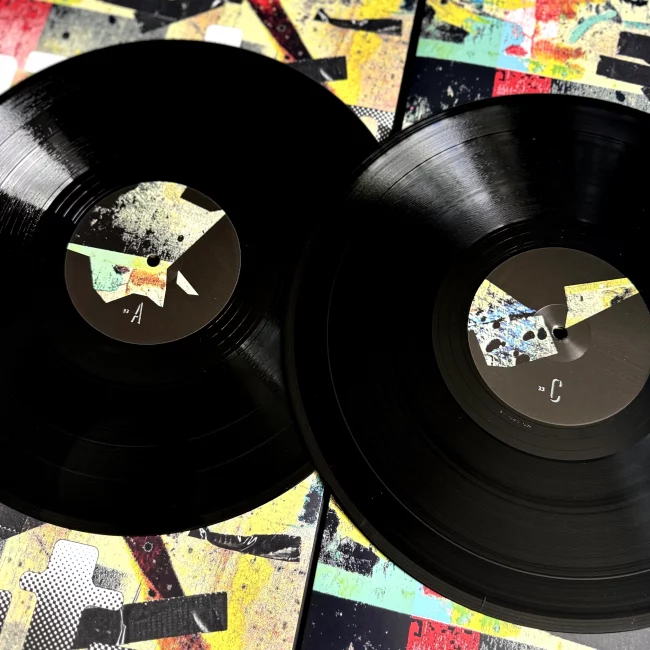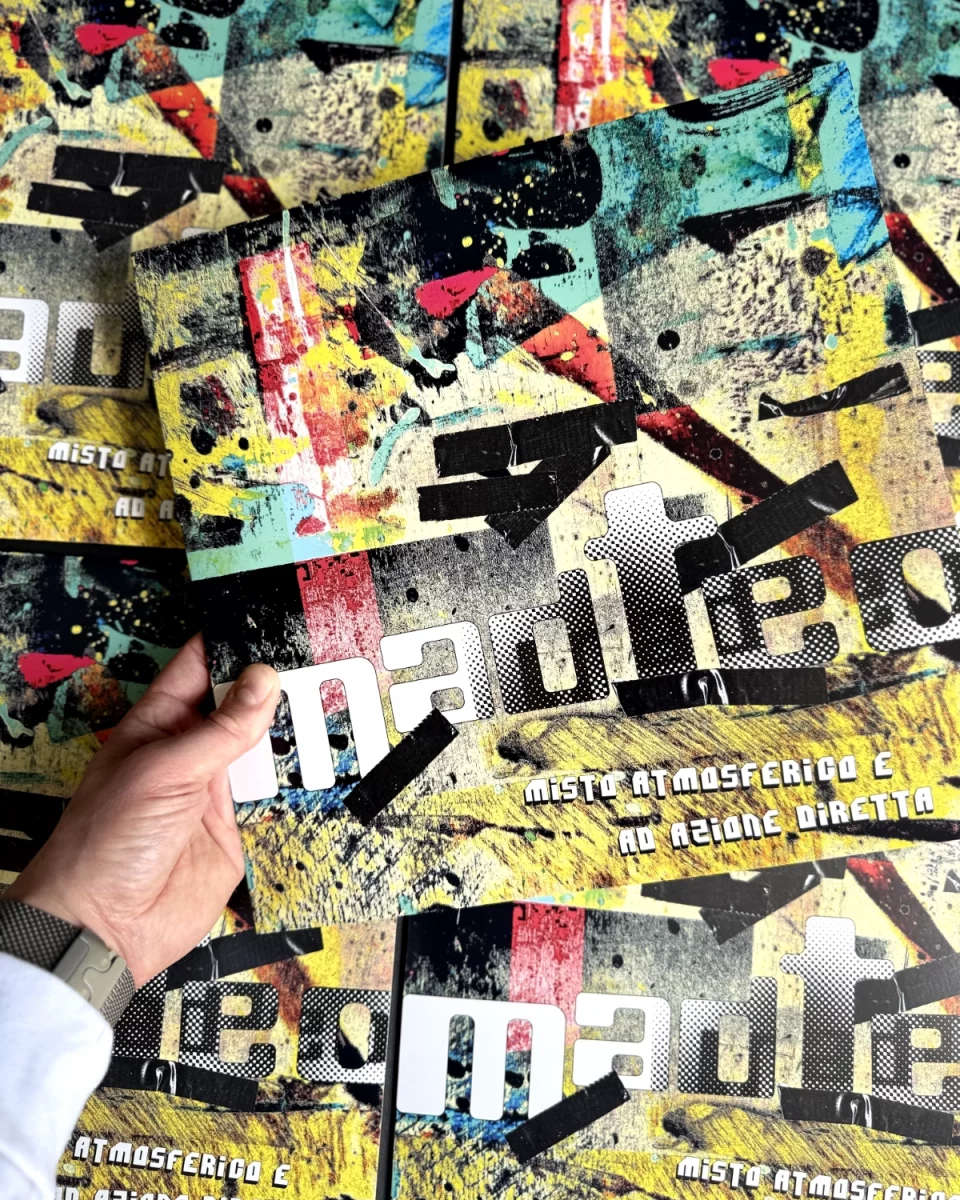While others chase clout with high-resolution press shots and digital hype, NYC sound visionary Madteo remains a spectral presence, lurking outside the frame, shaping his mythos from the margins. Two decades removed from the provincial peripheries of Padova and now deep into his third decade in New York, he has carved out a singular language filled with dubwise abstraction, scuffed grooves and tape-saturated left-turns.
A dollar-bin archaeologist, flea market dweller and reluctant historian of black gold, Madteo sculpts club tracks for collapsing architecture, built with thrift-store gear and blunted transmissions. Equal parts streetwise irreverence and avant-garde instinct, he exorcises moods, each soaked in the tension of memory, distance, and analogue decay.
It’s this tension between nostalgia and futurism, exile and homecoming, precision and entropy that fuels his latest album ‘Misto Atmosferico E Ad Azione Diretta’ issued on Unsure last week. A title lifted from the arcane mechanical musings of Enrico Bernardi, the Padovan inventor of one of the earliest combustion engines. The engine, like Madteo’s own practice, is clunky, unpredictable – designed for forward motion but just as liable to sputter, collapse, and reassemble itself mid-journey. From the crumbling echoes of Italo-house to the dub-choked corners of illbient New York, this release plays like a haunted travelogue, framed by a stubborn refusal to conform, a tribute to the art of the detour.
Yet for all his world-building, Madteo’s story resists mythologising. He’s the first to dismiss any notion of noble outsiderdom or romantic struggle. His life is built on serendipity, hand-me-down hardware and intellectually and aesthetically immune to the metrics of mainstream credibility. He’s frank about the contradictions: the love of DJing tempered by its impossibility of living from it, a compulsion to create shadowed by the fatigue of being audible in a landscape saturated with noise. If there’s a philosophy at work, it’s this: embrace limitation as a weapon, and trust that rawness in its sharpest edge.
There’s a strange clarity to Madteo’s world, even when the signal is warped. Whether recounting sunrise sets in Tokyo’s closet-sized clubs, unearthing Sun Ra’s records in a forgotten basement or gaining inspiration from John Chamberlain, what emerges is a blueprint for surviving a sleepless city that’s forgotten how to listen. Not by selling out or slowing down but by staying weird, staying wandering, and above all, staying real.
Interview by Mathias Chaboteaux
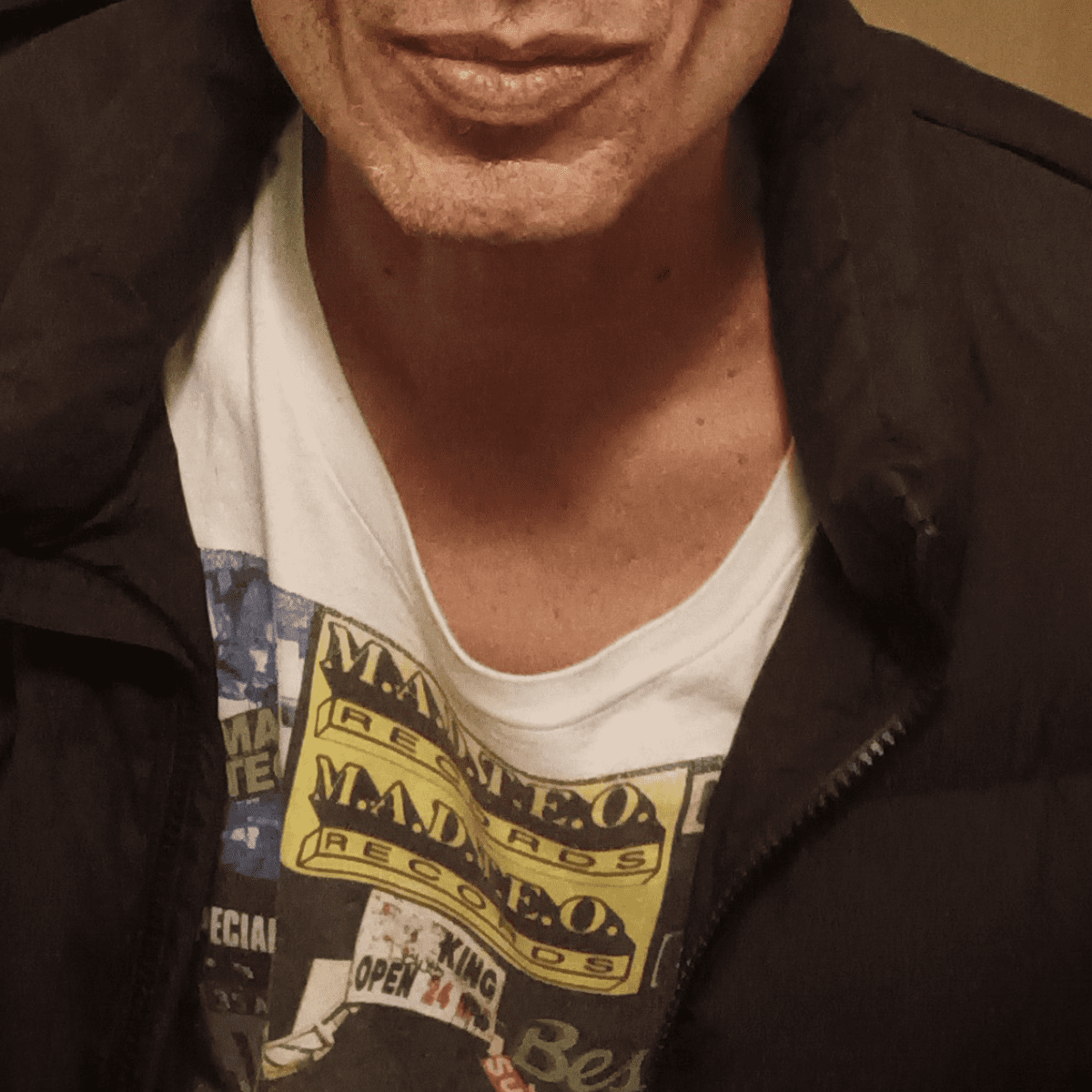
"I live as a recluse in Italy and socialize even less outside of my own family than I do in NY with my tiny circle where I rarely leave my neighbourhood and if I do it's only to go for a stroll in Manhattan, not to go clubbing (lol)"
Let’s start with time travel. You relocated from Padova in Italy for New York over two decades ago. How does nostalgia sneak up on you? Do you chase it down or let it slip through the cracks? And how does the Italian diaspora in New York play into this emotional geography?
Duality along other Duality seems to be the name of the game? For me, it is the fact that I come from the outskirts of a small city, so I’m from the provinces of an already provincial city. No longer one of the major centers for this or that field as it had been starting in the middle ages. So it’s a process of rediscovering the rich history of the hometown I had not been aware of as I developed the same type of extra affection for one’s hometown by leaving it that many expats often do.
Also reading non-fictional literature. I stumbled on many historical info relating to Padova that sparked my curiosity of a now distant past when Padova was, at various points and Centuries apart , on the cutting edge in various spheres, the arts, as the center of the Proto-Renaissance in the early 1300s, then a couple of centuries later, in the times of the scientific revolution had been considered in the academic literature, as in Herbert Butterfield’s mid 20th century standard college book which called Padova the birthplace of modern science.
All that stuff surprised me as it’s a very small and provincial city now so I can’t imagine a time when it was, for centuries, larger than Rome then when Rome became the seat of a large Empire, Padova remained its most important outpost in Northern Italy.
As I’ve been completely non-educated in traditional schooling I’ve picked up things on my own through books, traveling etc. Coming from a provincial background and having not gone to school basically I have a Junior High School education so it has been quite surprising and certainly it’s given me new perspectives on what my hometown was nearly a thousand years ago.I don’t really have ties to the Italian diaspora in New York and that is mainly because my era where I had some I was working in restaurants but that was decades ago.
Your latest album title is ‘Misto Atmosferico E Ad Azione Diretta’. What was the spark behind its name?
The new title came from one of the earliest combustion engines, by Enrico Bernardi, a Padova Uni academic/engineer (originally from Verona). Those were words written to describe it. Bernardi’s was around the same period of Benz’s, so pretty early. As for the track selection, titles are usually picked from lists I keep adding to through the years.
You came of age during the golden era of Italian club culture – Club 99, Adriatic raves, that whole fever-dream of the ‘90s. How do you see the Italian electronic scene now? Any artists or movements that genuinely caught you off guard ?
Not very informed on what’s going on as of right now in Italy as much as anywhere else except for Japan a little but I get the sense the scene has gone through the same changes in Italy as much as elsewhere. ‘Club’ culture seems to have morphed into ‘festival’ culture, with the remaining clubs and music bars and the smaller type venues either filling a vacuum, niche or sludging along.
There are great producers pretty much all over Italy I just I can’t think of newer names frankly at the moment or that caught me off guard. Oh wait one name is Sonic Belligeranza, you could say that fits the ‘catching me off guard’. Also I got a really cool digital promo recently from the Italian label Gang of Ducks with a debut LP, ‘Ghost to Ghost‘ by Hans Arsen, def Italian label, in Torino been established for quite a long time now.
The artist however may not be Italian. I live as a recluse in Italy and socialise even less outside of my own family than I do in NY with my tiny circle where I rarely leave my neighbourhood and if I do it’s only to go for a stroll in Manhattan, not to go clubbing (lol).
Your fascination with the 25th Street flea market in New York is well-documented. What makes it such a magnetic space for you? Any legendary encounters that still haunt you? And what’s the latest intel on the infamous Spanish man from East Harlem, is he still running his mysterious trade?
Henry Africa Africa Gotta Go Gotta Go is sorely missed, unfortunately isn’t there since the lot’s new owner put in place a system making it more expensive to sellers so… Well the thing with flea markets I came to realise many years ago already is that they are actually one of the last vestiges of a long gone New York.
There are definitely types of people that I run into at that flea market especially because it’s extremely centrally located in Manhattan and sole of the people you see there are of another era, when NY (and the West) was real, before trap replaced rap and whatever one wears in NY is the same as anywhere. Remember being laughed at wearing baggy Calvin Klein jeans, for real, I mean just baggy not sagging baggy jeans. They were laughing because I wore baggy jeans! Now some Italians, even ones working in TV, have their faces covered in tattoos.
Flea markets also got cleaned up, the 25th St one too, but as its been there for many decades its a place where you see the type of NY characters you don’t see anywhere else, since the types I’m referring to are not young, mostly people who like me didn’t become rich, didn’t get that job making six figures or something like that so there are people who are still working class and still living in New York because they got one of those rent control apartments or rent stabilised (I always forget the difference in the two but those are the type of apartments with rents that don’t balloon) talk about a trick if you can get yourself rent controller apartment or rent stabilised well that would be one trick so you can live in New York and not pay exorbitant, ‘market rate’ rents.
You’re a certified dollar bin archaeologist. If you had to pick three absolute goldmine discoveries from the one-dollar crates, what would they be?
That’s my least favourite type of question, it always strikes me as a poor question. I don’t have favourites that way, I have tons of music I like, depending on what mood I’m in you know what I mean? I would pick these jazz records only because of how I found them, that is in my building’s basement, so not 1$ records but throwaway records are my favourites, the kind of music or monetary value being irrelevant.
Sun Ra’s ‘Ra to the Rescue‘ on his own label El Saturn with an incredibly wide range, from smooth soul infused type to the wildest sounds all in a single LP. The other Sun Ra one is ‘Blue Delight‘ LP on A&M with a gorgeous track ‘Sunrise‘ I hope to get to play at sunrise once.
3rd one would be ‘Solos’ by Richard Landry , a live recording in Leo Castelli gallery (Castelli gets credited as producer) on a Philip Glass label.
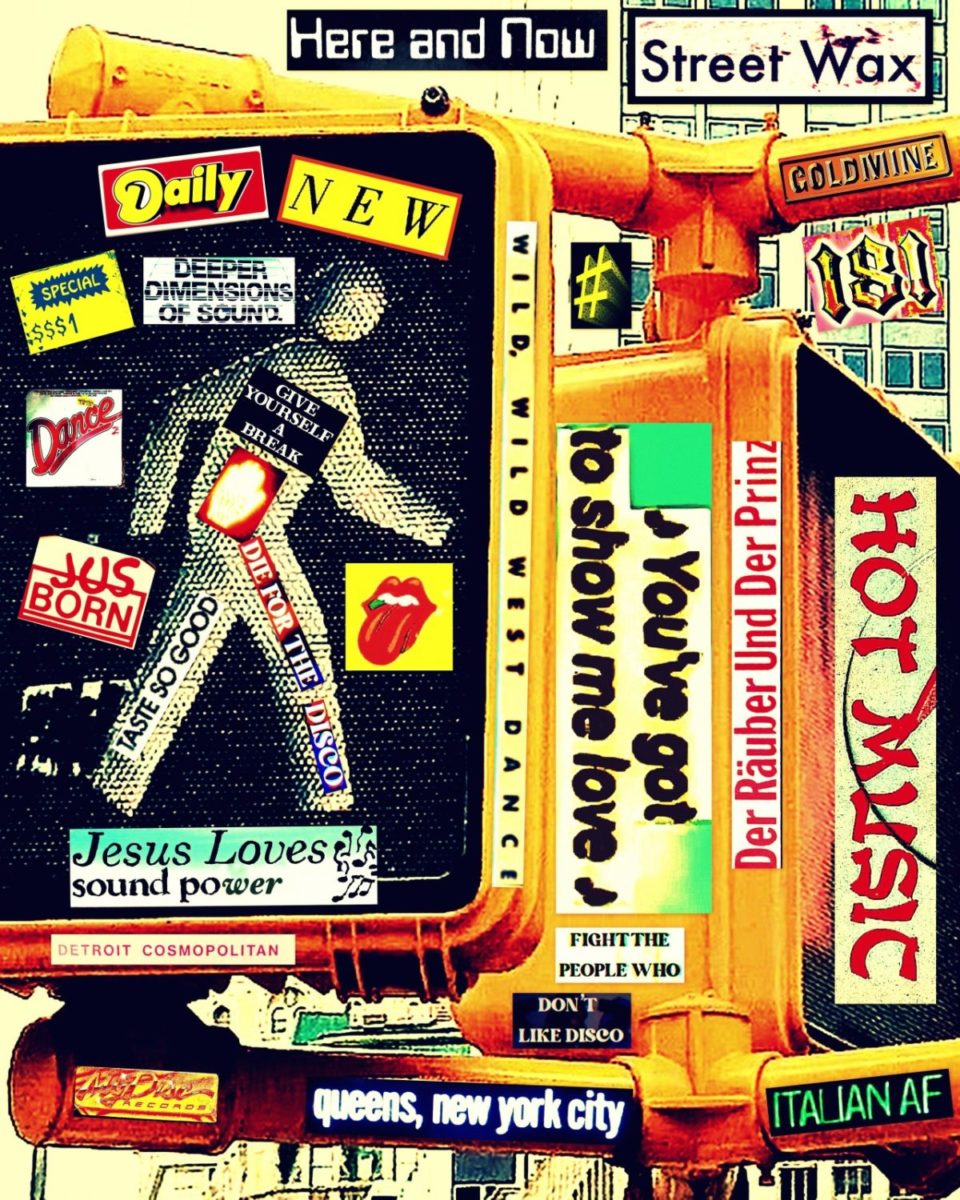
"I may have done it completely wrong as it's hard to be okay, content, when you can't survive doing whatever it is you actually do and spend all your time doing if keeping on doing something that yields the same unwanted results is literally the definition of mad."
What’s the trick to surviving as an artist in New York without losing your soul? How do you navigate the solitude that comes with being an independent operator in such a high-speed metropolis?
Having lived in 90s NY, There’s nothing in NY you can’t get elsewhere. Today, except for the fast moving pace of NY you probably can’t get AFAIK but as I said before, at this stage I don’t need to be in a super fast place anymore.
Can’t you tell I have no tricks or it didn’t work because tbh I have been basically making music now 22yrs years for the love but it was all prompted more than anything else by the love of DJing and my desire to make DJing my profession.
My thought process was that, since I was never one of those social butterfly types (I’m very social but into small groups) I liked small places but for me that never grew into anything and after learning to DJ at that restaurant for 10 years where I played once a week and then after five yrs I did two, three even four times a week but since it ended already 15 years ago, 2010 because I lost that job from 2010 my life has been kind on the edge because nearly never having a steady income and that meant not going out, not buying new records, ever, limiting my digging to fleas or Salvation Army etc.
Because that is the only type of source for physical music where I can afford it but to get back to my thought about my original intention for producing records and how wrong I had been all along in thinking that I was going to obtain a result that has not manifested (being a professional DJ) you can say that it has manifested but not even close to be sustainable, where I eke out even a meager income between DJing and making music, etc..
I thought that if I produced records and if my records were good enough to stand out in the myriad of music out there, if not guaranteed that would increase my chances of becoming a professional disk jockey. It’s why I’ve tried to develop my craft even though my main focus is music not so much the technique outside of the basic beatmatching.
Thus, building a discography was my strategy for increasing my chances of being a pro-DJ. Well that’s been disappointing because I realized that the two things seem, in my case at least almost completely disconnected.
To make it harder, the way my records are described, as weird, odd, etc.. isn’t exactly what most promoters would be looking for. Mea Culpa! To secure a career as a DJ I should have approached it from a whole other angle, like being a booking agent. So then you know all the spots, promoters, festival organizers, etc etc. I could’ve been a booking agent for a few years, get to know everyone then parlay that to “btw I’m a DJ now let’s go !!”. Seriously, that or something else cuz my non-trick ain’t worked !!! Or wish I could produce perfect, cookie-cutter club trax that got into whatever current popular style to get up on Beatport charts, etc.
My first love is DJing, sharing my music taste with people basically that’s what DJ is engaging people and it’s a privilege getting to share music in public, imposing, proposing your music taste is a privilege whether you get paid or not so I definitely don’t take it for granted if I’m playing music it’s music that I love using my intuition to play what’s right for that time, space and audience. ‘read the room’ etc
Look, the places that could support me don’t (since Im in NY going on 31yrs, last 6yrs Japan being the only place I played in yearly except for the ConVid1984) last time I played in NY was nearly a decade ago and not because I ask for a lot of money or am hard to deal with just not getting asked to but I know I’m also not hitting it from all the angles I should, could hit it from. If I was producing those other type trax referred above I would not be getting invited to play those tiny music venues in Japan with good systems and patrons with sophisticated tastes. All Catch22s and we all would like to have our cake and eat it too!!
I don’t do what I have to create those opportunities for myself, or not enough anyway. Like I could be trying to do my own parties but don’t, could go out and buddy up with the people I needa be rubbing elbows with, whose ass do I gotta kiss, whose cock do I gotta suck? But I don’t (passed the age to do that, not that I would have done it when younger. Just saying).
Plus all that takes time and money, catch22 yada yada. I can’t survive doing it, I’m middle aged and obviously in a young man’s game so basically it’s natural to want to go from under to overground, wanting your music to reach more people, or do I? I don’t know how else to feel if I was independently wealthy and I didn’t need to worry about rent.
In that case maybe I wouldn’t care but in my own situation I feel stuck. I don’t want to be arrogant or pretentious and I certainly don’t take things for granted so to be honest right now if I could I would want to make a completely standard pop track. Point is basically my s*** is raw because that’s how it comes out but if I could I would make a super sharp and polished pop song just to get on with it.
I may have done it completely wrong as it’s hard to be okay, content, when you can’t survive doing whatever it is you actually do and spend all your time doing if keeping on doing something that yields the same unwanted results is literally the definition of mad.
When I think about it, I guess I picked the most apt alias “mad” which also means different things and my choice of that name was 1: It’s literally my birth name’s alternate spelling (from the Hebrew meaning Gift of God).
Some call you an outsider, others a jack-of-all-trades. From your teenage nights sweating to Italodisco, to witnessing the golden age of boom-bap in NYC, to absorbing dub, Latin block parties and now reconstructing blunted dance cuts through a sample-based lens—where do you place yourself in this constellation of influences? Or do labels even matter anymore?
Labels seem to matter less by what I can tell. Sweating to Italo-House unbeknownst to me maybe (didn’t even know lots of those records I heard in the clubs back then, were actually Italian records, like piano house) more like, I am a 70’s born dude, so Italo Disco was already old ppl music by the time I started clubbing.
As a teen I was never into Underground music, growing up listening to pop or mainstream rock really. It took my first trip to the US when I was 15 and was taken to a couple of raves to be sorta ‘initiated’ into the techno realms. For the couple of years preceding that trip I had been introduced to rap via a kid in my Junior HS.
You’ve championed the illbient movement, a scene criminally overlooked. Who were the real architects of this sound, and why do you think it remained so under the radar? What drew you into it? And how did your sessions with Sensational unfold in the studio, was it structured chaos or pure instinct?
There’s never been a studio, never before, later, now and never. As far as I know the illbient term was coined to differentiate itself from what was coming out of the burgeoning UK scene which vaguely sprung from similar roots but it never really stuck.
To me the ones who can be considered the architects of that sound are the Wordsound label, especially the artist who set it up, Spectre aka Slotek aka The Ill Saint aka S. H. ‘Skiz’ Fernando. The name illbient seemed to have been associated later mostly with one NY figure , a DJ / Producer (DJ Spooky of Soundlab) initially also loosely linked with Wordsound, but who went on to become an academic.
I liked better Skiz’s own term, Dub-Hop. Dub was the roots and a massive influence of both Fernando’s music as told by him in the beginning of his label came about thanks to a initial input by bassman and Grammy winning producer Bill Laswell who in those years had a studio in Greenpoint Brooklyn just up the road from the Wordsound compound on Williamsburg’s North Side.
What drew me to it was their bass-heavy, sparse sound which had an ominous tension I thought was a perfect sonic representation of New York’s still ill, premillennial, apocalyptic, desolate urban landscape.
That desolation was still visible in many parts of Manhattan (the old , pre-High Line West Side), starting from where I discovered Wordsound, when Spectre feat Sensational were the opening act of a Mad Professor live show at an underground (basement level) venue known as The Cooler located in a space formerly where actual coolers to store meat were, when the Meat Packing District was still, during the day, the neighborhood of/for meat packers.
You’ve also worked behind the scenes, assisting at WordSound HQ. From the inside looking out, what truly makes a record label special? If you had to give survival tips to indie label owners today, what would they be?
I can barely survive by myself and I barely had a label so I’m not the right person to answer that. As an observer, maybe cynical but I can say that we’ve been in the Post-label era now for a while. The labels who stuck to it throughout the transformation (destruction, really) of the real music industry era deserve my utmost respect but from what I know, it’s a money’s game, now and always.
So the only survival tips I have is to find wealthy partners because a record label is a vanity project, something to do with your time that at least revolves around what you love, if you really love music anyway. Other than that you should be ready to deal with a lot of fickle people, at best … Here’s what an old musician and music biz stalwart said to describe the music business “If you haven’t been in a studio with a person you absolutely despise, you aren’t in the music business”.
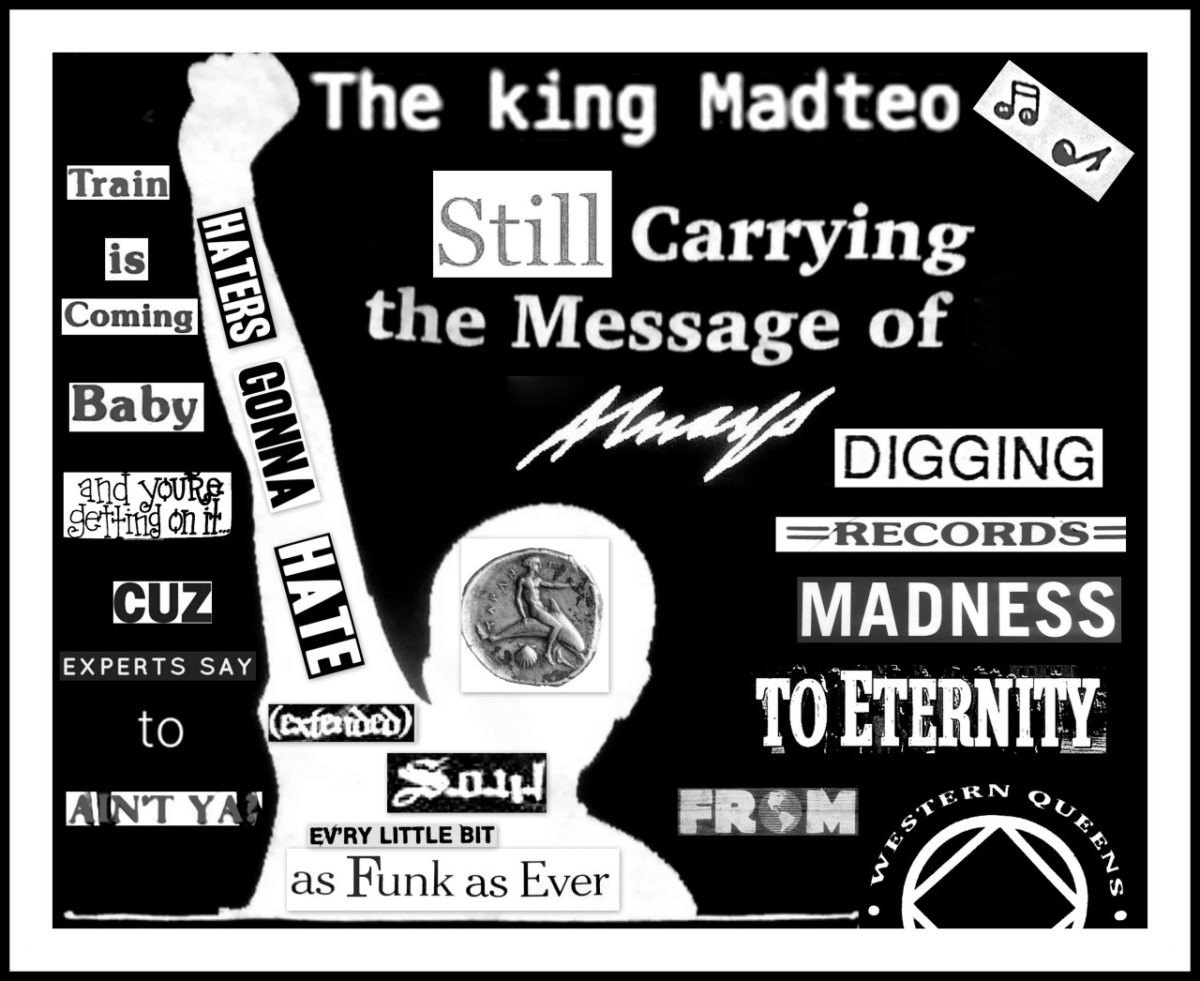
"So much is out there growing out of a love for the music and anyway at my age to be honest I don't know if I feel like that (wanting to sound original) I realised a while ago that is natural what I perceive to be the weaknesses in my sound may be my strength, for better or worse."
Your collaborations have always been selective – Joy Orbison, DJ Sotofett, Workshop Records, to name a few. You seem to operate on a deep trust system, prioritizing human connections over industry mechanics. Was there a specific moment that cemented this approach for you? Any past experiences that shaped this philosophy?
All by chance. Interesting that you sensed a deep trust. More like the loss of it. Or maybe the deep trust in whatever relationship formed with and in this music thing is in that I deeply trust someone else will show up, gain your trust then stab you in the back, steal your shit or spread rumors, etc.
It’s been noted and easy for everyone to relate that the people who can most hurt, even kill you are the ones closest to you, so your friends are your best killers, best as in best placed to inflict the most damage. So yeah I deeply trust that there’s always another one out there who’ll help you make you even more cynical than you already are. Many experiences left a pretty strange taste in my mouth to be perfectly frank.
Then again what do you expect from an elbow-your-way fake-it-til-you-make-it type field we are in… the best people in a humane down to earth sense may make so so music or run a so so label while the worst, most arrogant, two faced assholes make the illest records?
Since it’s mostly not one’s choice or you don’t really know the people personally since we’re dealing more and more not in person, you can’t be sure who you’re dealing with most of the time and even when you do deal in person, hmmm… I used to welcome ppl into my apartment, recently I made it a point to not do that anymore. As my 95 year old neighbour says “Fidarsi e’ bene, ma non fidarsi e’ meglio”. (Trust is good, but not trusting is better.)
Your production process has evolved, from a hardware purist to embracing Ableton. What has been the biggest revelation in this transition? You’ve spoken about limitations as a key to creativity, how do you know when a track has reached its final form? Is there a moment where you just feel it’s done?
Not a purist, never have been, I just started with some basic hardware then switched to DAW. Yeah the limitations is very old thing everybody knows limitations are the mothers of…especially in this limitless DAW environment where you can add so many sounds you have no choice but to force yourself to set those limitations whichever way you do it because in my case at least if I don’t do that number one I will never finish anything number two you always run the risk of clogging the track where too many sounds are competing for space cluttering and mudding the results.
A track is done when playing the latest mix down I can play through the whole thing without something about the track making me go mmm that shouldn’t be there or that should be different, louder or quieter, a note longer or shorter, etc.
I have adopted a similar approach to John Chamberlain, who was an abstract expressionist I discovered late in my life and is my favourite of the much overrated so-called ‘abstract expressionists’ because well he was the sculptor and my superficial acquaintance with that movement only was aware of the painters.
When I first discovered John Chamberlain who made sculptures using car wrecks, manipulating, bending them into a piece but loved his response when asked that question ‘how do you know when a piece is done?’ and he simply said ‘when I don’t have any more holes to fill’ I love that and in my case that is a pretty good guideline that I’ve been using even if that space in some cases is filled with silence because of course we know filling space can also mean filling that space with silence and as music lovers know silence in a track is as crucial as any sound especially from all we know from Jamaican dub and how the use of space being a crucial element how you deal with that space how you fill or empty that space, play with that emptiness.
So to paraphrase John Chamberlain I know a track is done when I don’t hear any more spaces that I need to fill or alternatively by taking a sound out so actually creating space. Because filling the space with silence you’re still dealing with it since that emptiness can turn a cool track into an amazing track. Any average track can be dubbed-out and by dubbing it out you’re exploiting that principle of limitations, restrictions, emptying out.
One of the tracks on your album, ‘Metrazol (4 Art Ind Epil Cons),’ seems to reference Pentylenetetrazol, the controversial anxiety treatment discovered by neurologist Ladislas J. Meduna. Is this a conceptual nod to its legacy? The drum patterns give me shades of Theo Parrish’s ‘Footwork’—is Detroit still an influence lurking in your production process?
Oh really I don’t remember that to be honest that treatment or neurologist don’t ring any bells but love reading reference books and my neighbour in New York has a great personal library including many such type of books so I’m guessing it came from that sort of book.
Detroit is still an influence I mean it will never cease to be but that phase of being so directly inspired and influenced by Detroit’s sounds has now ended in the sense that goes back to my first few years of producing when people like Theo Parrish where becoming the icons they are now still but as a music lover I sort of moved on and into other areas and I go back to the physicality of the sculptor mentioned earlier, John Chamberlain, because of the angularity, I use it as as a benchmark , to gauge my own tracks or what I look for.
You once said, ‘The best way to get noticed is to try not to get noticed.’ Has this strategy worked out for you?
No I don’t think it has or it maybe seemed to have worked initially but what I mean is simply you just gotta make music for yourself make tracks you think are ok and if you can make things you think are pretty cool probably you are on the right path. Anyway I may be completely wrong as it all depends on what your musical taste and education.
In my case I aimed for originality but even that is whatever as that can mean different things to different people. I wanted to sound original but that all depends on my knowledge, how long you been doing, so the use of the term ‘original’ is contingent upon the perception I had of what originality was, which is innately limited because I only knew what I knew then and still loads I don’t know now even if I never stopped digging especially when I never set out to be a specialist of any one sound more I craved the best music I can get my hands on in as many styles as possible.
So much is out there growing out of a love for the music and anyway at my age to be honest I don’t know if I feel like that (wanting to sound original) I realised a while ago that is natural what I perceive to be the weaknesses in my sound may be my strength, for better or worse.
Misto Atmosferico E Ad Azione Diretta is out now via Unsure. Buy a vinyl copy from Inverted Audio Record Store and digital from Bandcamp.
